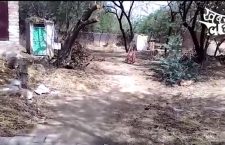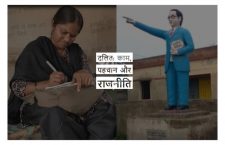The Chief Minister’s recent Bundelkhand visit had in store a few unexpected shocks for its people.
On his second visit to Bundelkhand – considered to be one of the most poorly developed regions of the state he runs – exactly a year since he was sworn in as the Chief Minister of Uttar Pradesh, Yogi Adityanath made a few heavy-duty promises. On a packed itinerary that saw him in Chitrakoot on April 12 and in Jalaun and Lalitpur the next, the hinterland witnessed a mildly altered head of state. Gone were the bhavya deepak diya-lighting rituals on the Ram ghat – here in its place was a C.M. talking the talk that is the zeitgeist. Perhaps humbled by the bypolls results that saw a loss for him and his party in what is considered his math, and the recent much-touted Modi-Shah visit has meant sharp learning curves for this 45-year-old Chief Minister, learning on the job. In Jhansi, he described Bundelkhand and Purvanchal as his government’s “key focus areas”, and stressed on newer avenues of employment. There was a great emphasis on soon-to-be-established factories –in a zone notorious for migration, which has seen permanent shut-downs of glass factories and sugar mills, this is no small promise. Ditto for the defence production corridor that brings with it milestone-bearing importance, showcasing rozgaar in the swanky style favoured by the political party Adityanath belongs to.
But in the buzz and the whirlwind of the C.M. recce, what Adityanath seemed to have blind-sided was the irony of his big Bundelkhand visit. It had ended up wreaking havoc on that section of the rural population that has not yet all gone the mass exodus way – the Bundeli farmers.
Here’s what happened: The U.P. C.M. expressed his desire to give water to the cows, to make them drink it from his own palms. The heat has, after all, already set in, in the badlands, and given the government’s “focus area” with bovine matters, this was not hugely unexpected. What did come as a surprise though, and an unpleasant one, was the collateral damage that this ministerial wish would affect. Immediate energy was spent in ensuring that there was flowing water in the streams where Adityanath was expected, such that stored water from dams was released into the streams in several places. This turned out to be horrible timing for the farmers of several villages, such as Kashai gaon of Chitrakoot, where the crops that had been harvested and recently-cut were ruined.
We meet Pintu Singh, an enraged farmer who starts off on his rant, after we’ve visited his khet that looks demolished, “Modi ji wanted to come here, so they did this.” He corrects himself, “I mean Yogi ji”, and continues the tirade, “When we need the water, then there isn’t any. We have to do our farming under extreme circumstances also. And now that he is on a visit here and they have to present a different on-ground picture, there is suddenly water to be released…” He adds the rhetoric that he probably doesn’t see as such, “It’s as if we don’t matter.”
It’s a sentiment that found resonance all through Chitrakoot this week with a visiting C.M. who failed to hold janta darbars and managed to keep most of the local press at a huge distance. In fact, activists, lobbyists, citizens, were all barred from entering the spaces that Adityanath occupied and/or intended to.
Shivam of the Bundelkhand Azad Sena, an organization that lobbies for citizen rights, made the trip to Karwi from Banda, and perhaps illustrated the cold-shoulder treatment best. Having spent a few hours waiting to meet the C.M. to discuss the best ways possible to make Bundelkhand corruption-free, “yeh kalank hataya jaaye yahaan se”, he said he wasn’t too hopeful of meeting Yogi ji in the flesh. While Ram Aasre Srivastav, who’d clocked in about two hours the same day waiting added, “Hamaari samasyaein yeh Yogi ji kya sunenge ya dekhenge? (He won’t bother listening to our distresses).”
The Yogi ji in question, meanwhile, ensured unprecedented “zor-shor se” prep on the part of local BJP administration – which basically meant that we did not find too many officers on public duty on public duty through the last two weeks. Everyone was involved in “maharaj’s” visit, though it was unclear why. Some more collateral damage of the visit was suffered by local shop owners lining the kasbah roads on which Adityanath’s entourage was meant to pass – they were dismantled overnight. And some of the school exams in Banda were suspended for two days.
Unarguably though, the farmers whose crops were ruined overnight bore most of the brunt of this visit. Madhav Prasad Verma of Kashai village had gone to bed on the night of April 12, with plans of putting his wheat through the crusher machine on April 13, which was the harvest festival Baisakhi. But the morning only brought him woe – there was no produce left to harvest. “Fasal toh chali gayi, ab kya? (My crops are ruined, now what?),” he asks us, stoically.
– Pooja Pande
This Khabar Lahariya article first appeared on The Wire.

